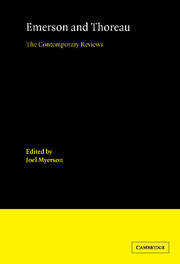Book contents
- Frontmatter
- Contents
- Series Editor's Preface
- Introduction
- RALPH WALDO EMERSON
- Nature (1836)
- “The American Scholar” (1837)
- “Divinity School Address” (1838)
- “Literary Ethics” (1838)
- Essays [First Series] (1841)
- “The Method of Nature” (1841)
- Essays: Second Series (1844)
- Poems (1847)
- Essays, Lectures, and Orations (1847)
- Nature; Addresses, and Lectures (1849)
- Representative Men (1850)
- English Traits (1856)
- The Conduct of Life (1860)
- May-Day and Other Pieces (1867)
- Society and Solitude (1870)
- Letters and Social Aims (1876)
- HENRY DAVID THOREAU
- RETROSPECTIVE ESSAYS BY CONTEMPORARIES
- Index
“Literary Ethics” (1838)
Published online by Cambridge University Press: 23 March 2010
- Frontmatter
- Contents
- Series Editor's Preface
- Introduction
- RALPH WALDO EMERSON
- Nature (1836)
- “The American Scholar” (1837)
- “Divinity School Address” (1838)
- “Literary Ethics” (1838)
- Essays [First Series] (1841)
- “The Method of Nature” (1841)
- Essays: Second Series (1844)
- Poems (1847)
- Essays, Lectures, and Orations (1847)
- Nature; Addresses, and Lectures (1849)
- Representative Men (1850)
- English Traits (1856)
- The Conduct of Life (1860)
- May-Day and Other Pieces (1867)
- Society and Solitude (1870)
- Letters and Social Aims (1876)
- HENRY DAVID THOREAU
- RETROSPECTIVE ESSAYS BY CONTEMPORARIES
- Index
Summary
A new comet, or rather meteor, is shooting athwart the literary sky of old Massachusetts, in the person of Ralph Waldo Emerson. He is the son of a distinguished clergyman of Boston, some time since deceased, and is now of middle age. He is attracting much public attention, and is an object of the severest reproaches from some, and the most profound admiration from others. He has delivered two or three courses of lectures in Boston, on moral and literary subjects, which have been attended by crowds. Many enthusiastic talented young people are represented to be perfectly fascinated by him. His reputation has, of late, extended so widely, that he was invited last July to deliver the Annual Addresses before the Literary Societies of Dartmouth College, and the Senior Class in the Divinity College of Harvard University. He appears to be a profound admirer, student, and imitator of Thomas Carlyle, several of whose works he has caused to be republished in this country. The character of his mind is poetic and imaginative, and he is strongly inclined to certain mystical and visionary habits of thought and discussion. His talents are unquestionably of a respectable order, though, as it appears to us, much inferior to the scale assigned them by his fervent admirers. The qualities, however, just mentioned, united with an irreproachable, lovely, and elevated moral character, and the graces of a commanding person and impressive elocution, go a good way to explain the effect which he has produced on a highly educated, refined, and excitable community.
- Type
- Chapter
- Information
- Emerson and ThoreauThe Contemporary Reviews, pp. 55 - 76Publisher: Cambridge University PressPrint publication year: 1992



